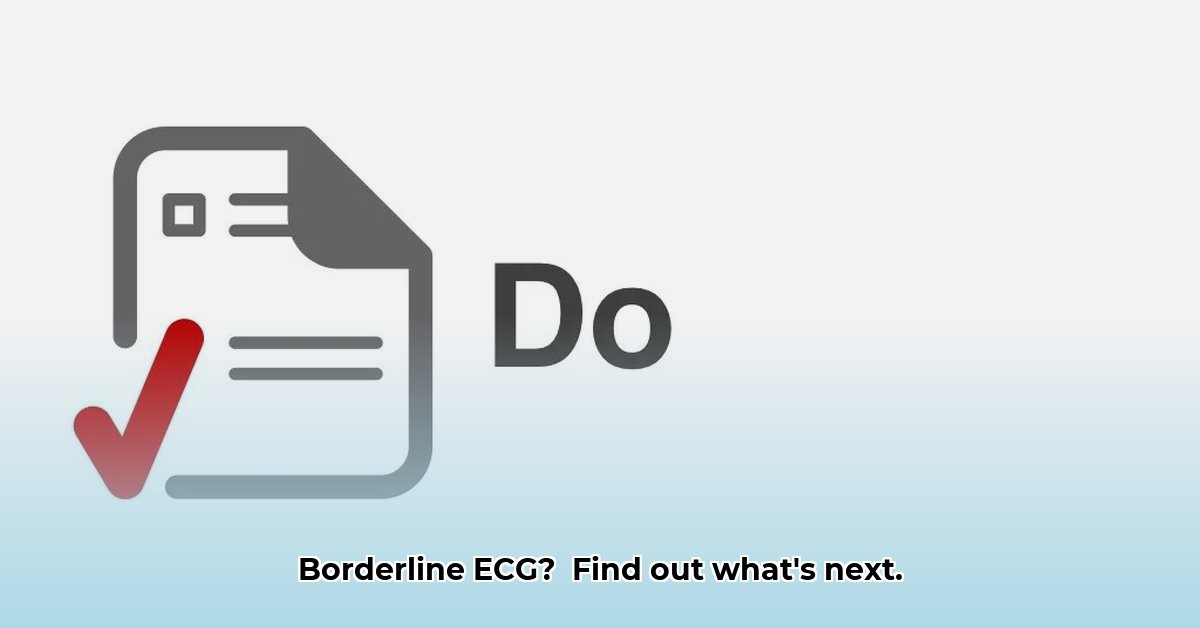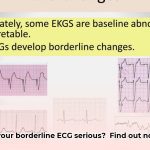Receiving a “borderline” electrocardiogram (ECG) result can be alarming, leaving you uncertain about your heart health. This comprehensive guide aims to clarify the meaning of a borderline ECG, explore potential causes, and provide actionable steps to ensure your well-being. For more in-depth information, see this helpful article on borderline ECG results.
Understanding Borderline ECG Results
A borderline ECG indicates that your heart’s electrical activity deviates slightly from the typical range. It’s not a definitive diagnosis but rather a signal for further evaluation. Think of it as a yellow light, urging caution and prompting a closer look.
Decoding Heart Rhythm Irregularities
An ECG measures the electrical signals that control your heartbeat. A borderline result suggests minor variations in these signals, which could be due to various factors. It’s crucial to understand that a borderline ECG doesn’t automatically signify a serious heart problem. It simply means your doctor needs more information to make an accurate assessment.
Distinguishing Between Benign Variations and Potential Concerns
It’s essential to differentiate between harmless variations and potential underlying issues. Some individuals naturally have slight differences in their heart’s electrical activity. However, a borderline ECG can also be an early indicator of a heart condition. Further testing will help determine the cause of the irregular reading.
Your Action Plan: A Step-by-Step Approach
Upon receiving a borderline ECG result, it’s important to take proactive steps to understand your heart health. Here’s a structured approach to guide you:
- Schedule a Follow-Up Appointment: This is the most crucial step. Contact your doctor to schedule a consultation to discuss your ECG results.
- Document Your Symptoms: Keep a detailed record of any symptoms you’re experiencing, such as chest pain, shortness of breath, dizziness, palpitations, or fatigue. Note when these symptoms occur and how long they last.
- Prepare Questions for Your Doctor: Write down a list of questions to ask your doctor. This will help you make the most of your appointment and ensure all of your concerns are addressed.
- Undergo Further Testing (If Recommended): Your doctor may recommend additional tests, such as an echocardiogram, stress test, or Holter monitor, to gain a more comprehensive view of your heart’s function.
Understanding Common Diagnostic Tests
- Echocardiogram: An ultrasound of the heart that provides detailed images of its structure and function.
- Stress Test: Monitors your heart’s activity during exercise to assess its response to physical exertion.
- Holter Monitor: A portable device that continuously records your heart’s electrical activity for 24-48 hours, capturing any intermittent irregularities.
- Blood Tests: Assess cholesterol levels, electrolyte balance, and other factors that can affect heart health.
Lifestyle Adjustments for a Healthier Heart
While awaiting further tests or after receiving a diagnosis, adopting heart-healthy lifestyle habits can significantly improve your cardiovascular well-being.
- Balanced Diet: Focus on a diet rich in fruits, vegetables, whole grains, and lean protein. Limit processed foods, sugary drinks, and unhealthy fats.
- Regular Exercise: Aim for at least 150 minutes of moderate-intensity or 75 minutes of vigorous-intensity exercise per week.
- Stress Management: Practice stress-reduction techniques, such as yoga, meditation, deep breathing, or spending time in nature.
- Adequate Sleep: Prioritize 7-9 hours of quality sleep each night to support overall health and heart function.
- Smoking Cessation: If you smoke, quitting is one of the most impactful steps you can take to protect your heart health.
- Limit Alcohol Consumption: If you drink alcohol, do so in moderation.
The Impact of Diet and Exercise on Heart Health
A healthy diet and regular exercise can lower blood pressure, reduce cholesterol levels, and improve overall cardiovascular function. These lifestyle changes can also help manage weight and reduce the risk of developing heart disease.
Stress Reduction Techniques for Cardiovascular Wellness
Chronic stress can negatively impact heart health by increasing blood pressure and heart rate. Practicing stress-reduction techniques can help lower these levels and promote a sense of calm and well-being.
Potential Causes of a Borderline ECG
Several factors can contribute to a borderline ECG reading, ranging from lifestyle factors to underlying medical conditions.
- Lifestyle Factors: Stress, anxiety, caffeine intake, nicotine use, and lack of sleep can all influence heart rhythm.
- Medications: Certain medications can affect heart rate and rhythm, leading to a borderline ECG.
- Electrolyte Imbalances: Imbalances in electrolytes like potassium, magnesium, and calcium can disrupt the heart’s electrical activity.
- Underlying Heart Conditions: In some cases, a borderline ECG can be an early sign of a developing heart condition, such as coronary artery disease or arrhythmia.
- Technical Factors: Incorrect electrode placement or patient movement during the ECG can sometimes affect the results.
Understanding the Role of Medications and Supplements
Be sure to inform your doctor about all medications and supplements you’re taking, as they can potentially affect your ECG results.
The Influence of Stress and Anxiety on Heart Rhythm
Stress and anxiety can trigger the release of hormones that increase heart rate and blood pressure, potentially leading to irregularities in heart rhythm.
Addressing Specific Concerns: Elderly Patients and Athletes
Borderline ECG findings can have different implications for elderly patients and athletes, requiring tailored approaches.
Managing Borderline ECG Findings in Elderly Patients
In older adults, age-related changes in the heart can influence ECG results. It’s crucial for doctors to consider these factors when interpreting borderline ECGs in this population.
- Age-Related Cardiac Changes: As we age, our hearts undergo changes that can appear atypical on an ECG.
- Importance of Comprehensive Medical History: Providing a complete medical history, including any existing heart conditions, medications, and family history, is crucial.
- Ruling Out Underlying Conditions: Further testing may be necessary to rule out underlying heart conditions that are more common in older adults.
Interpreting Borderline ECG Results in Athletes
Intense training can lead to physiological adaptations in the heart, resulting in ECG patterns that may appear abnormal but are actually normal for athletes.
- Athlete’s Heart: The athlete’s heart is characterized by increased heart size and altered electrical activity due to intense training.
- Distinguishing Normal Adaptations from Pathological Conditions: It’s essential to differentiate between normal adaptations and potential underlying heart conditions.
- Consulting a Sports Cardiologist: Seeking guidance from a cardiologist experienced in sports medicine is crucial for accurate interpretation.
What NOT to Do: Avoiding Misinformation and Panic
It’s essential to avoid self-diagnosing based on online searches. The internet can provide inaccurate information and cause unnecessary anxiety.
The Dangers of Self-Diagnosis
Self-diagnosing can lead to incorrect assumptions and potentially harmful decisions. Always rely on the expertise of a qualified healthcare professional.
Trusting Your Healthcare Professional’s Expertise
Healthcare professionals have the knowledge and experience to accurately interpret ECG results and provide appropriate guidance.
Long-Term Outlook: Prevention and Monitoring
A borderline ECG doesn’t necessarily indicate a major concern. By following your doctor’s recommendations and adopting heart-healthy habits, you can enhance your prospects of maintaining excellent cardiovascular health.
The Importance of Regular Check-Ups
Regular check-ups with your doctor can help monitor your heart health and detect any potential problems early on.
Proactive Steps for Heart Health Management
Taking a proactive approach to heart health management can significantly reduce your risk of developing heart disease.
Key Takeaways
- A borderline ECG isn’t a diagnosis but a signal for further evaluation.
- Your doctor will consider your symptoms, medical history, and lifestyle.
- Further tests may be necessary to determine the cause of the irregular reading.
- Lifestyle adjustments can significantly improve heart health.
- Open communication with your doctor is crucial for accurate interpretation and appropriate management.
Remember, a borderline ECG is a starting point, not a conclusion. With proper medical oversight and a proactive approach to your health, you can effectively manage any potential heart concerns and live a long, healthy life.
- Best Books on Meditation Recommended by Mindfulness Experts - January 30, 2026
- Best Mindfulness Books for Anxiety, Sleep, and Daily Peace - January 29, 2026
- Books On Mindfulness For A Happier, More Present Life - January 28, 2026
















